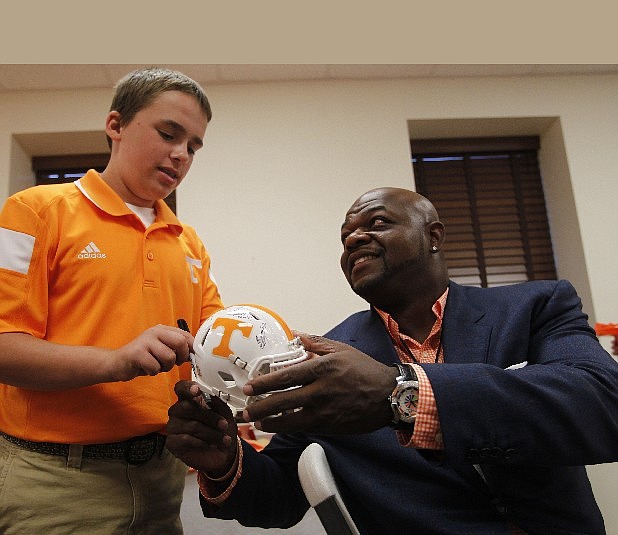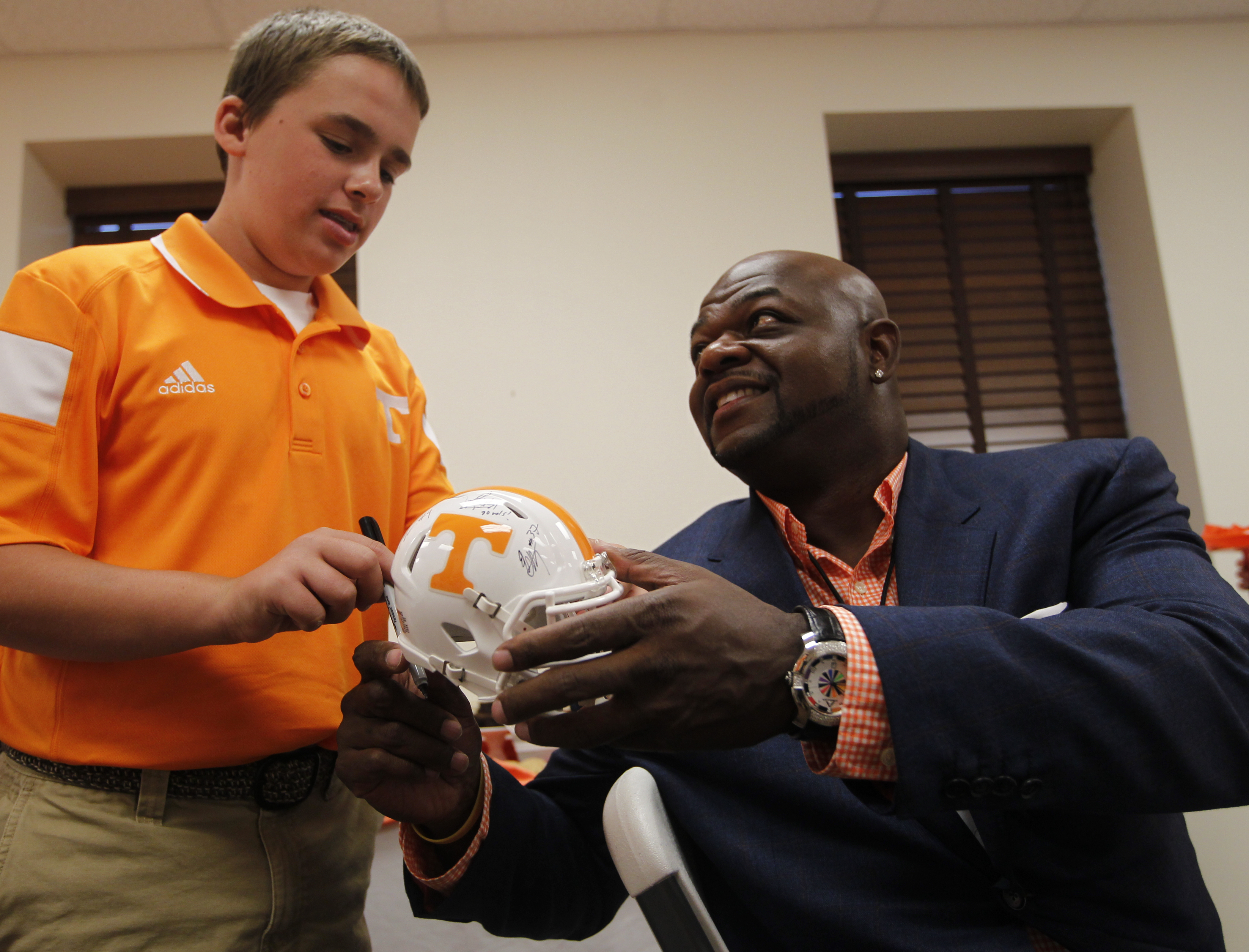Nearly a dozen former University of Tennessee football players were in South Pittsburg this weekend to help with Eddie Moore's youth camp. Moore, the former South Pittsburg and UT star who later played for five years in the NFL, brought in fellow former UT players Al Wilson, Eric Westmoreland, Troy Fleming, Gerald Riggs Jr., DeAngelo Lloyd, Jabari Davis, Steven Marsh, Corey Larkins and Keyon Whiteside for a meet and greet with fans at the Princess Theater on Friday night. Those players then worked with kids for about four hours at a youth football clinic Saturday morning.
Times Free Press assistant sports editor Stephen Hargis was the moderator for Friday's question and answer session and took note of some of the players' best responses.
Q: You guys talked earlier about how tough it's been to watch the program struggle since you were there. From making former players feel welcome, and embracing Tennessee traditions, to bringing in better recruiting classes, it seems that Butch Jones has things headed in the right direction. What are some things you've noticed that you like about where the program is headed and what are your expectations for the next couple of years?
Troy Fleming: "With Coach Jones, when you walk into the facility now it's like you never left. The guys who have worked around the program for years are at ease now, which tells you things are good again. The biggest thing about Coach Jones is he actually does his job. Unlike that guy we call Derek Doolittle, who really did very little. This recruiting class that just came in, and with what they're already getting for next year, I believe we'll be better this year and we'll be back competing in a big way in 2015, which is good because there's a lot of people who are going to hear my mouth again."
Al Wilson: "I really don't even want to say the names of the two guys who were there between Coach Fulmer and Coach Jones. They don't deserve to have their names mentioned with Tennessee football. As somebody who went 45-5 while I was at UT, that's a place I care a lot about and I'm just glad that there's somebody in charge again who gets it and who wants to be there and take the program back to where it was and where it should be. For Coach Jones to embrace us and bring us back in is a big deal for us."
Corey Larkins: "I just want to see some fight. I've seen our guys for the last few years not only get beat to the ground, but then the other players push up off their chest to go back to the huddle and our guys just got up and walked back to the huddle. I want to see some guys with some fight and defend the program. That mentality came from the guy we had before Coach Jones. Derek Dooley was a loser. He'll always be a loser and he rubbed off on the program and created a losing attitude."
Q: Recruiting is such a big business now, a lot more than when you guys went through the process. What were some of the things you remember about your first visit to UT and what were the things that made you want to join the program?
Jabari Davis: "Tennessee felt like home from the first day I came there. They were real people. Troy Fleming was my host, and he left me. Some girl called Troy and he left me, a five-star recruit, to go to a party. But I already knew I wanted to come there by then so it was all good."
Corey Larkins: "They stuck me with Dante Stallworth. At the time he had a broke foot and no car. We had no way to go anywhere. He was like, 'Man, what do you want to do tonight?' I said we could do whatever and Dante was like, 'Well, I ain't got no car and my foot's broke so I guess we'll just stay in here and chill and drink Kool-Aid. That was my recruiting trip, so obviously it was something else about the program that made me want to be a part of it. I guess for me it was being in that stadium and seeing how the fans react when the team comes out and how loud they get when things are going the right way."
Eric Westmoreland: "When you go to your home state school, it means so much more to you. You grow up watching those helmets with the orange 'T' and when you get the chance to wear that and represent your state, it's just so special. To run through that 'T' and have all those fans cheering for you; that's tough to describe."
Q: One thing that almost every UT fan wishes they could do is run through the 'T' on game day. You guys got to experience that so often, but you've all agreed that it's still one of the most special memories from your playing days. For the fans here tonight that won't get to experience that, describe what made that such a unique memory.
Gerald Riggs: "The hair stands up on the back of your neck. It starts from the time you're in the tunnel looking out at the field and hear the crowd roaring. Especially at night with the fireworks off in the sky as you're coming out. By the time you get to the sideline you're gassed. You were so excited and used up so much adrenaline just running through the 'T' to all those fans, that's one of those things you still look back on and realize there's no other feeling you'll ever have like it."
Eddie Moore: "You'll always remember the first time you run through the 'T' and you'll always remember the last time you run through it. You're so nervous that first time, all you can think about is, 'Don't trip and fall.' When I got to Miami to play in the NFL, it was weird getting used to being able to hear when we came out on the field. The crowd didn't make that much noise. It was kind of a letdown after coming from Tennessee. There's nothing like it anywhere."
Keyon Whiteside: "The Vol Walk even before we got to the stadium used to do it for me. I'd see all those people lining the street for us. ... Whew, that got me going. That's when I knew it was time to get ready."
Q: All of you guys played for Coach (Phillip) Fulmer and most played on the defensive side for Coach (John) Chavis. What did those two coaches mean to your careers?
Eric Westmoreland: "We played for a defensive coordinator in John Chavis who was very intense. Once game time rolled around it was like unleashing a pack of hungry lions. We were tired of hitting each other and wanted to hit somebody else. The competition we had during practice was so tough."
Keyon Whiteside: "I learned how to compete. I came in and I was the best of the best so I thought I'd come in and play right away. The first day we get there, and I'm not real big on giving people props, but when I get there and see 2-7 [Wilson] going through drills I'm thinking, "Oh, he's nice." I knew I might have to wait a little bit. Coach Chavis talked to me about just preparing myself for my turn. That taught me about having to wait and that in life, opportunity waits for nobody. But if you're prepared, when that opportunity comes, you can be ready to shine."
Eddie Moore: "I have Coach Fulmer's cell number and I know even if it's years since I've seen him I can call him. I was just at Coach Chavis's house recently to have dinner and that's the type relationship I have with those guys. The whole time I was at Coach Chavis's, all he talked about was his days at UT. I could see in his eyes that he misses it. He misses it a whole lot. He didn't want to leave there, but he had to and he's done big things at a new place. But you can tell Tennessee is still a special place for him."
Al Wilson: "My freshman year was tough, and I almost quit a couple of times. But we had coaches there who wouldn't let me leave. They told me I had too much talent to leave and they wanted me to do something with my life and that if I stuck it out I could. That staff did a great job of standing by the players and really being more than just coaches. They worked us so hard during practice that once we got to game day, we didn't need to be motivated by coaches anymore. We motivated ourselves. We were there to win games and if you weren't out there ready to sell-out completely to win games then you need to get off the field."
Q: One of the things all of you guys have talked about tonight is the respect you have for Al Wilson. What is it about him that makes him special to you and the program still to this day?
Steven Marsh: "I remember the coaches telling us to watch film of him. They would say no matter what position you play, watch Al Wilson and how he plays like every play is his last play. Play with that same intensity on every snap and you'll be better and we'll be a better team.
"We used to go to his house for a barbeque, and I was always worried about knocking something over or breaking something at his house and what he might do to me if I did. He just had that look all the time that you never wanted to cross him. But once you got to know him, he's one of the most genuine guys you'd ever meet."
Corey Larkins: "I got to UT after Al, and I remember coaches and trainers would tell me at practice or around the locker room, "Ohhh, you wouldn't be doing it like that if Al was still here. I don't care how big the person was, they would tell you that you better respect what we had just in case Al came back or heard how you were practicing. He was the guy that nobody wanted to let down, even years after he left."
Eddie Moore: "If you came to Tennessee to play linebacker, you had a bar that had been set that you had to reach and that was Al. That's who you represented as a linebacker at UT. When I first got there the coaches gave me a choice of which number I wanted, either 27 or 37 and I picked 37 because I had so much respect for him that I didn't feel I could fill his shoes. The best thing about him, when he would come back he didn't just give you a handshake. He'd give you a hug and his cell number and tell you if you needed anything to call him. That meant a lot. That's what being a part of the UT family is about."
Contact Stephen Hargis at shargis@timesfreepress.com or 423-757-6293.


